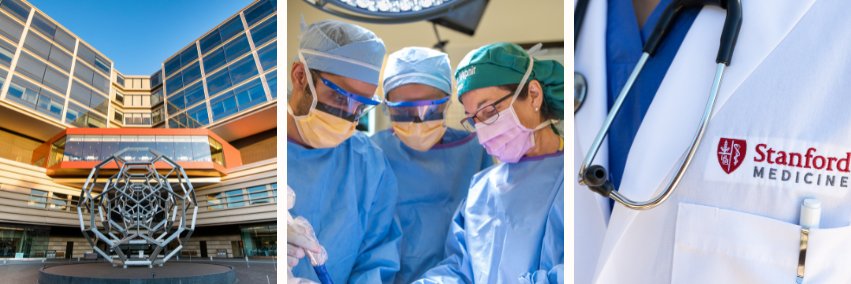
Stanford Health Care
@StanfordHealth
The official account of Stanford Health Care Advancing knowledge, improving lives
A Stanford Medicine research dietitian spells out what ultra-processed means, why such foods are unhealthy and how to eat a healthy diet in a world filled with them. med.stanford.edu/news/insights/…

A visionary $100 million matching grant from the Weill Family Foundation is bringing together @StanfordCancer and @UCSF to launch the Weill Cancer Hub West -- an innovative collaboration that will transform cancer research and care in the next decade. stan.md/4f2tRD7
Touch interventions — whether they come from someone familiar or from a healthcare professional — are shown to reduce feelings of depression, anxiety & physical pain. The human hand plays a key role in healing! stanford.io/4lgoeU9
Stanford Medicine’s AI-powered app listens in on clinical visits, freeing doctors from note-taking and allowing them to focus on patients. Christopher Sharp, MD, demonstrates how this tech enhances the doctor-patient relationship. stan.md/3v9eWog
Do you know the signs of heat stroke? Symptoms include headache, dizziness, and nausea. Learn what to do and where to go for help: stanfordhealthcare.org/campaigns/wher…

A blood-test analysis developed at Stanford Medicine can determine the “biological ages” of 11 separate organ systems in individuals’ bodies and predict the health consequences. med.stanford.edu/news/all-news/…

Learn practical strategies for comforting children when exposed to scary news, including expert advice from @StanfordChild pediatric and adolescent psychologist Elizabeth Reichert. healthier.stanfordchildrens.org/en/?p=27807
A Stanford Medicine research dietitian spells out what ultra-processed means, why such foods are unhealthy and how to eat a healthy diet in a world filled with them. med.stanford.edu/news/insights/…
The first cohort of residents at Stanford Health Care Tri-Valley arrive in Pleasanton to start a three-year program in family medicine. med.stanford.edu/news/all-news/…

A Stanford Medicine-led study has found that better stenting practices now mean that implanting stents is about as effective in preventing death and stroke as bypass surgery — though outcomes depend on individual cases. stan.md/3EOJ50J

As ketogenic therapy gains momentum in treating neuropsychiatric disorders, we asked Stanford Medicine’s expert Shebani Sethi for the key takeaways. med.stanford.edu/news/insights/…

New imaging technology helps Stanford Medicine surgeons reduce repeat breast surgeries. med.stanford.edu/news/all-news/…

Stanford Medicine donations continue to assist community members with food and housing security, and expanded access to dental and medical care, among other contributions. stan.md/4iSwmIg

Check out these quick notes on the low back physical exam! For more tips on inspection, palpation, provocative tests, the neuro exam & awareness of more concerning causes of back pain: stanford.io/2VAoTDP
This Fourth of July, make sure your celebrations are safe for kids. Get expert tips from @StanfordChild's Dr. Stephanie Chao on enjoying fireworks responsibly. bit.ly/40wwQxq
Inspired by his lung cancer journey, #StanDOM's Bryant Lin's heartfelt keynote at @StanfordMed's 2025 commencement urged grads to stay curious, creative & kind. Watch now. ➡️ stan.md/4nie1rN
Around 7,000 babies in the U.S. are born each year with a cleft lip or palate. These conditions are treated by @StanfordChild's Cleft and Craniofacial Center, which recently celebrated patients and staff at the annual picnic on the Stanford campus. bit.ly/45RuY6b
In the same week he finished his cancer treatment at Stanford Medicine Children's Health, this Merced teen is celebrating in a special way: meeting Buster Posey at a @SFGiants game. #HodgkinLymphoma #BassCenter healthier.stanfordchildrens.org/en/celebrating…
We need your help, SBC Donors!🩸 We have an immediate need for all blood types due to high hospital demand and low appointment numbers. Your donation can save lives. If you can donate, please make an appointment at sbcdonor.org/donor/auth/sig…; walk-ins are also welcome!
Microplastics are in the water we drink, the food we eat, the clothes we wear and the air we breathe. What does that mean for our long-term health, and what can we do about it? med.stanford.edu/news/insights/…
